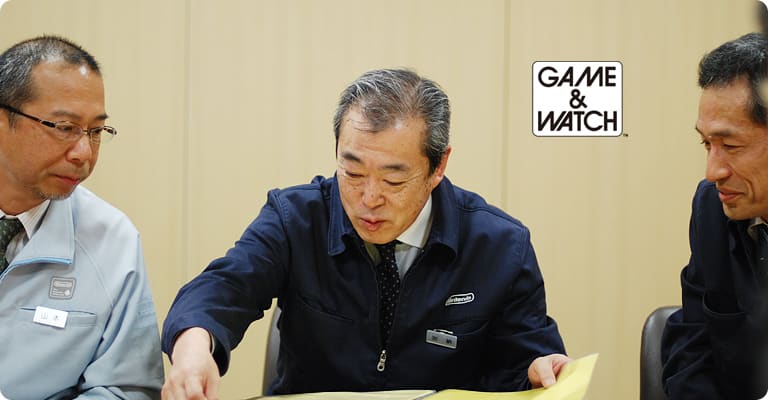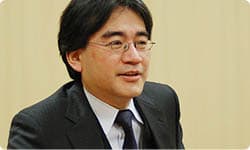Absorbed in Development
When you were making Game & Watch, the word pasokon (personal computer) didn't exist and there weren't any hard disks.
Right. I remember putting an eight-inch system disk into the computer and then a floppy disk for the data.
We've discussed making the test models for Game & Watch. What did you do after that?
I would discuss with Sharp the LCD manuscript for the complete game screens and then submit it.
How long did it take until you put it on the ROM and it was a product?
About two months.
You were putting out one Game & Watch title each month, so each month Kano-san would design something and Izushi-san and Yamamoto-san would take turns developing the software. The Game & Watch games went on sale at an astounding pace.
We aren't the only ones responsible for that. The members of Research & Development 1 and the improving production capability of the Uji plant were an incredible help.
That's right. Everyone came together and pulled behind it. I think everyone involved could say, "I made this."
I had some numbers looked up in preparation for today. The Game & Watch series sold 12.87 million domestically and 30.53 million overseas for a total of 43.4 million.
That's the first time I've heard those numbers!
(laughs)
Back then, sales figures never made it to the developers.
They show that this product was accepted by people all over the world. Kano-san, when did you feel that the wind was at your back?
Hmm, it was such a long time ago. Perhaps it was when Game & Watch: Parachute18 came out. I think that may have been what kicked off the boom. But we didn't know how many had sold and just focused on making the next title. 18. Game & Watch: Parachute: The first Game & Watch game in the Wide Screen series. The player uses a rescue boat to catch skydivers falling from a helicopter. Released in June 1981.
I see. Rather than worry about how many sold, you just had to make the next one.
My head was full of the next game rather than the ones we'd finished.
We didn't ask, "How were sales for that one game?" We just tackled the next one.
We wanted to turn our ideas into games as quickly as we could.
Even if you didn't know precise numbers for how many sold, you did know that lots of people were buying them, right? I mean, you released a total of 59!
I did start seeing lots of people playing them when I went out.
At Christmas, we even went to assist sales.
Right, right! We all went to the retail outlets. We stood in the store and helped with sales.
In those days, even guys at the forefront of development went to the storefront at Christmas time to help with sales!
That's right.
I'd be ordered to go to a particular shop, but really didn't want to go.
Why not?
The person in charge at the shop said I was no good at wrapping.
(laughs)
I wasn't used to it, so of course I was no good at it!
Aside from learning how to wrap, it was a good experience.
Yeah.
Wrapping products properly is important but It must also be a great learning experience to see how consumers choose to buy a product.
I thought so, too. I can remember to this day how a grandmother and her grandchild came into the store and the child said, "Here! This is what I want!"
Her grandchild wanted a Game & Watch system.
Yeah. But she said, "It's too expensive."
A Game & Watch system cost 5,800 yen, which was expensive for a toy back then.
Right. I realized as I stood there how important it was to make a product of corresponding value. You don't learn that until you stand at a sales location, so it was an important experience to encounter the consumers' reactions and the atmosphere of the shop.
And that kind of experience comes in handy for later projects.
Yes. I also gained motivation to make something better next time.
Which title does each of you remember the most?
For me, that would be Game & Watch: Turtle Bridge.19 As mentioned earlier, a lot of the time we would all throw out ideas, but in the end Yokoi-san's ideas were the ones to be adopted. But Game & Watch: Turtle Bridge was my idea.
It's a masterpiece. 19. Game & Watch: Turtle Bridge: The eighth Game & Watch game in the Wide Screen series. The game's character has to carry items across a body of water by hopping on the backs of turtles. Released in February 1982.
Thank you! (laughs) I put a lot of effort into it. The test model with the lights was really fun, but the adjustments wouldn't go well and the final product ended up not being as good as the original!
You couldn't quite achieve the same operability.
Something was slightly off. Nonetheless, that game made a lasting impression on me.
How about you, Kano-san?
For me, it's Game & Watch: Parachute. I think it sold well, too.
Game & Watch: Parachute was the first game released with a wide screen.
That screen made it easier to view the game. Making Game & Watch: Parachute and starting in on Game & Watch: Octopus after that was a really fun time.
Game & Watch: Octopus came out less than a month after Game & Watch: Parachute.
We worked on them almost at the same time.
I developed the software for Game & Watch: Octopus, and Yamamoto-san did Game & Watch: Parachute. Kano-san looked like he was having a blast with the visuals.
Yeah, I was. I said things like, "Will people in other countries get it if I draw the octopus's eyes like this?" (laughs) For the alarm, I drew a picture like Tako no Hatchan.20 I remember having a great time. 20. Tako no Hatchan (Hatchan the Octopus): A manga by Norakuro author Suiho Tagawa that appeared in 1931. Many older people in Japan immediately associate octopuses with Hatchan.



